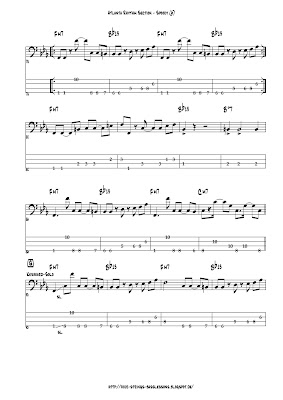In part 3 we covered all the natural notes on the fretboard up to the fifth fret:
Or they can be arranged starting on the note A to form the relative minor scale called A minor:
(Don't Fear) The Reaper is built on the A minor scale:
The song's distinctive guitar riff is built on the i-vii-vi-vii chord progression in A minor, forming the chords A5 - G - F6(sus2):
 |
| guitar riff |
BÖC's bassist Joe Bouchard mainly has two ways of playing to this chord progression:
Either he only utilizes the root the fifth and the octave of each chord.....
...or he plays the basic triads to some of the chords...
In the course of the song these two appraoches are combined and varied.








%2BThe%2BReaper%2B-%2B1.TIF)
%2BThe%2BReaper%2B-%2B2.TIF)
%2BThe%2BReaper%2B-%2B3.TIF)
%2BThe%2BReaper%2B-%2B4.TIF)
%2BThe%2BReaper%2B-%2B5.TIF)
%2BThe%2BReaper%2B-%2B6.TIF)

















%2B-2.jpg)





















